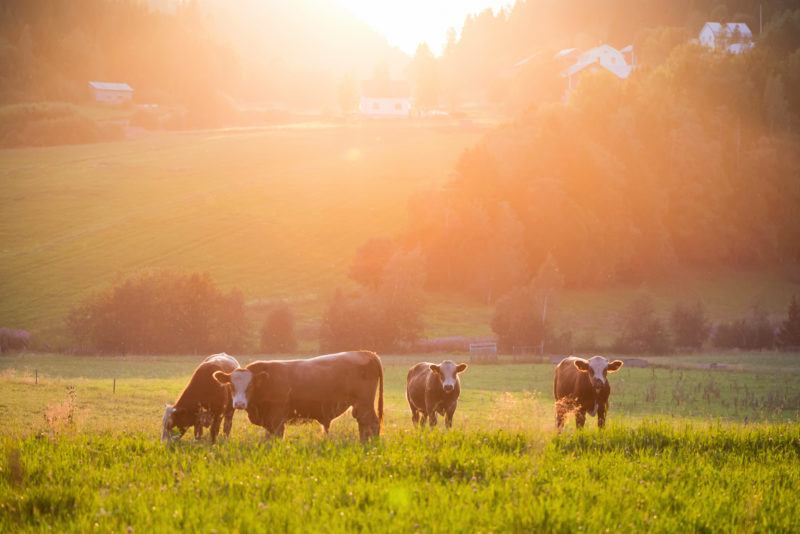The Climate Impact of Meat

When your ideology states that climate change is the most important thing facing the world and some pesky pandemic has the poor judgement to interrupt The Cause, you need to act fast. There must be something that connects the pandemic back to my virtue signaling venture, thought the novelist and vegetarian activist Jonathan Safran Foer, before penning ‘The End of Meat is Here’ in the New York Times this week.
The canals of Venice are suddenly clear, gorillas and rhinos are saved, air quality of major world cities improved, and global CO2 emissions have dropped by some astonishing number, perhaps 17%. These are amazing developments, over and above what any green champion could have imagined – yet nobody is happy about them. The activists, the people they pretend to represent, or the politicians that got us into this mess seem more upset than ever. Being locked in our houses with society put on hold was not the great societal revolution that we imagined.
What then?
The pandemic had us reevaluating what is essential, writes Foer. And food is essential. And that slaughterhouse in South Dakota had a large corona outbreak. One thing led to another, and suddenly the pandemic teaches us that vegetarianism is inevitable. Braa-vo!
His story is the same old, same old of meat’s alleged outsized impact on the planet. The channel is varyingly land usage, cows’ methane emissions or deforestation. Foer’s piece is also stuffed with typical Animal Rights complaints – most of which are conducive and perfectly consistent with a libertarian worldview.
Let me abstract from all that and focus on the core message: meat is bad because it wrecks the planet.
Right off the bat, we are faced with the scientifically tricky question: does it? Despite Foer’s denouncements that his statement is “a banal truism” rather than “a refutable perspective” (if so, why bother writing an opinion piece about it?) what goes into the calculation of livestock emissions is not evidently clear. Investigating the research underlying the claim that animal agriculture accounts for a large share of global emissions, Frank Mitloehner, Professor in U.C. Davis’ Animal Science Department, writes
“For livestock, they considered every factor associated with producing meat. This included emissions from fertilizer production, converting land from forests to pastures, growing feed, and direct emissions from animals (belching and manure) from birth to death. However, when they looked at transportation’s carbon footprint, they ignored impacts on the climate from manufacturing vehicle materials and parts, assembling vehicles and maintaining roads, bridges and airports.”
The statistical mischief came about because
“they only considered the exhaust emitted by finished cars, trucks, trains and planes. As a result, the FAO’s comparison of greenhouse gas emissions from livestock to those from transportation was greatly distorted.”
In contrast, the Environmental Protection Agency calculates that all of agriculture (of which livestock is but one part) amounts to only 10% of global greenhouse gas (GHG) emissions – much lower than transportation and electricity production that account for over a quarter each.
These same mischievous calculation techniques are employed to show that green energy has lower CO2 emissions than fossil fuels – considering the material use, duplicative and negative impact on grids, constant and inefficient maintenance, that is far from obvious. The trouble isn’t wind turbines as machines – they are already approaching their physical limits – but the wind as a source of energy; wind as powering society is, to quote Matt Ridley’s eloquence on the topic, “just not very good.”
Next up: the idea that the category “meat” produces more harmful impacts on the planet is laughably mistaken. Not all foods are created equal – and the hipster latte that power greenies’ yapping is often as big a climate villain as the “meat” they indignantly attack (no surprise there!). Chicken is on par with beer (strike 2, hipsters!), and not much better than tofu (third time’s a charm!). Or beans. And it’s probably better than cheese. From an emissions standpoint, asparagus flown in from Peru or Mexico is most definitely worse than eating free-ranging hens or their eggs.
To complicate things, cows and goats often graze on land that’s unsuited for agriculture, because of poor soil, bad geography or uneconomically located fields – or sometimes as a part of a sustainable rotation of land use. The cattle farmer Joe Stanley writes that
“grassland absorbs CO2 from the atmosphere as the grass grows, and sequesters it in the soil as organic matter; the more it’s grazed and trampled by livestock, the more it absorbs.”
A conclusion echoed by Britain’s National Farmers Union, observing that their beef production is much more environmentally friendly than commonly believed.
Probably infuriating Mr. Foer even more, I may include the zero (or even negative) emissions from the consumption of wild boar and deer that my family hunts on our own grounds. The climate profile of game meat in overflowing rich-country forests beats almost any vegetable. That weak defense true believers brush aside as “exceptions that could never be scaled.”
Correct: game meat obviously couldn’t scale to feed the human population, let alone the population of the U.S. But scaling doesn’t seem to be a problem for green champions when it comes to the more pertinent issue of energy production. Wind and solar don’t scale, but that hasn’t stopped anyone from proclaiming success every time a state-subsidized company comes up with another wind farm.
As such, I don’t see why scale in their view should matter for zero-emission meat consumption: If wind power for the few, unable to reliably provide for the masses, is still considered green and clean, then game meat, unable to supply seven billion people with zero-emission meat, is similarly green. Like a virtue signaling Tesla driver, I can proudly display my contribution to The Cause while munching on some delicious wild boar ribs – regardless of whether that practice passed Immanuel Kant’s Categorical Imperative. For as long as green activists and politicians pretend that wind and solar can solve our energy needs, I can willfully pretend that game meat solves the moral charge laid at my feet because of meat’s outsized climate footprint.
Making matters even blurrier, as statistical perspectives usually do, the British newspaper The Guardian in 2017 compared the impact on the climate from various actions. Using data from researchers Seth Wynes and Kimberly Nicholas, The Guardian, not exactly known for its neoliberal wreck-the-earth attitude, showed that going vegan indeed had some climate impact; it reduced an average Brit’s annual CO2 emissions by about 11%. This change, however, was entirely swamped by other actions such as living without a car, abstaining from transatlantic flights, and massively so by having fewer children!
Note that I’m not proposing that we should have fewer kids or engage in the anti-humanism so prevalent among the left, but pointing out that people generally of Foer’s persuasion themselves show that switching to a vegan diet does very little to advance The Cause. Especially compared to the work-from-home and don’t-travel ordeals that the corona pandemic is forcing upon us anyway. Against that background it becomes very odd to push meat as the big villain in the biggest society experiment showing the climate impact of everyday travel and production shutdowns.
And for all of those thinking Buy Local is the way to go in emissions, Pierre Desrochers of University of Toronto has bad news for you: “producing food requires much more energy than moving it around,” making complaints about ‘food miles’ or long-distance trade rather hollow.
One of the best sentences in Steven Pinker’s extraordinary book Enlightenment Now! is
“by conflating profligacy with evil and asceticism with virtue, the moral sense can sanctify pointless displays of sacrifice.”
Environmentalists, and especially those pushing for less consumption of meat, are experts at this. Contrary to what they say, meat is not the greatest threat to the climate; meat is not a uniform category of emissions, strictly dominated by vegetarian (or vegan) diets; livestock are not a horror, easily and prudently replaced by fields of soy and corn.
But ideologues have no patience with nuances like that. It’s “go vegan” or “go home.” It doesn’t matter much what the facts are, as long as The Cause is advanced.










